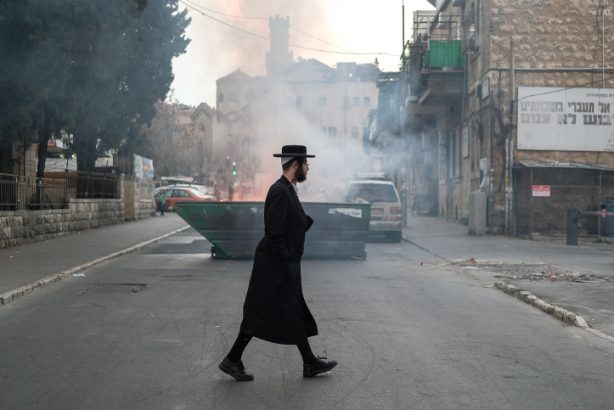Dan Perry was the Cairo-based Middle East Editor and London-based Europe-Africa Editor of the Associated Press. He also served as AP’s bureau chief and chairman of the Foreign Press Association in Jerusalem, and is the co-author of two books about Israel. He writes on geopolitics at https://danperry.substack.com
Perched on hilltops in the middle of the Holy Land is Beitar Illit, a town of 70,000 devout Jews living in cookie-cutter red-roofed apartment blocs and spending their days in an extraordinary manifestation of devotion to religious ritual. It offers a useful perch from which to contemplate Israel’s strangely unremarked yet ever-advancing national suicide.
For starters, Beitar Illit is not formally in Israel. It is a West Bank settlement and the disputed territory has not been annexed, because of international and other constraints. Yet a series of machinations contrive to make this almost irrelevant to the Jewish residents. For example, although Israel has no absentee balloting for Israelis abroad, through a series of legal contortions the residents, like all settlers and unlike their Palestinian neighbors, can vote. Indeed, there are about 500,000 settlers in this situation, living among three million West Bank Palestinians. In the last election, in November 2022, pretty much one hundred per cent of the voters in Beitar Illit, which is surrounded on three sides by Palestinian villages, backed religious and other parties that are all in the rightwing bloc that has striven to maintain and deepen this status quo.
About 30 miles to the west is Tel Aviv, the center of a conurbation of about two million which is one of the richest cities on earth. It sports an electric nightlife scene and an eclectic, jumpy cuisine, and it holds a raucous annual Gay Pride parade of which the residents are quite proud. The de facto capital of ‘Start-up Nation,’ this version of the country is a world-beater on scientific publications published per capita and most metrics that suggest modern-world success.
These two versions of Israel are well into the advanced stages of an as yet non-violent civil war. The non-stop drama over Prime Minister Benjamin Netanyahu – his corruption trials, jackhammer agitprop, endless prevarications, snarling battles with the military and other Israeli ‘elites’ – it is all, in one way or another, a manifestation of this kulturkampf.
Many countries in the world, including and perhaps especially the United States, have different versions of this culture war. But in Israel there is a twist: People in Beitar Illit and other Haredi towns have seven children on average. People in Tel Aviv and the rest of modern Israel, perhaps two. The gap is narrowing; the differences seem irreconcilable. Israel has deadly enemies, and they are looking on, licking their chops.
That is the real story of the Hamas invasion and massacre of 7 October. That is the real story of the Hezbollah group’s shelling of Israel since shortly after that attack. How do they dare? Why are they so brazen and defiant, faced with a nuclear power? It is because they calculate that Israel is crumbling from within.
That very real concern is not what the Western world generally sees – neither Israel’s friends nor the ‘progressive’ youth who (seemingly unaware of their own countries’ histories) have decided in large numbers to view Israel as the ‘oppressor’ and a ‘coloniser’ and a representative of the powerful.
Indeed, the truth is obscured by the fact that in highly visible ways Israel that has been spectacularly successful, posting a per capita GDP higher than France, Germany and Britain in 2022 (about $55,000/year). Its astounding tech sector has driven innovations from instant messaging and mobile phone technology to drip irrigation, capsule endoscopy and the world’s first personal computer microprocessors. It punches well above its weight in Nobel prizes, boasts an elite military and exports leading academics, cybersecurity and television formats.
All this is on a track to vanish for two reasons.
The Long Shadow of the ’67 War
The first can be traced to the moment of the country’s seemingly greatest triumph: the 1967 Six Day War. Facing the threat of invasion, Israel launched a preemptive attack and quadrupled its territory in days. Israel was saved, but also became entangled with the West Bank and Gaza. As both Jewish hubris and Arab rejectionism set in, Israel began building Jewish settlements in both. Although Israel pulled out of Gaza in 2005, the 7 October invasion by Hamas has now drawn the military back in; no one knows where this will go.
For Israel to control the West Bank and Gaza both means an Arab majority in the combined three-element territory, which as a single unit would be home to almost eight million Arabs (of whom two million live in Israel proper as citizens) and just over seven million Jews. This devastates Israel’s claim to be a democracy: After 57 years, having built towns for Jews all over the West Bank while maintaining ultimate control over security, entry and exit, the currency and natural resources, the occupied land is in effect part of Israel. That makes Israel a place where millions of Palestinians have few protections and rights.
For some decades, there have been on-again-off-again efforts to reach a partition deal (which typically has been misnamed ‘peace’) – but the sides could never agree on terms and the settlements kept expanding. That expansion would deserve a place of honor in any update of Barbara Tuchman’s ‘March of Folly,’ because at some point partition becomes impossible. And Israel is the side that needs partition more.
Increasingly, Palestinians contemplate abandoning the two-state paradigm and instead demanding full annexation of the West Bank. They’d demand the Palestinians receive Israeli citizenship and voting rights, same as the Israeli Arabs. If that were to happen, even with just the West Bank incorporated and Gaza left out, the Jewish proportion of Israel would fall from 80 per cent to under 60 per cent.
Such a binational state would probably not be peaceful. Moreover, the Jewish proportion would dramatically drop. Most of the Jews are attached to the current quasi-Western character of their country, are far wealthier and quite mobile. Many would flee; they are talking about it already, and there is a veritable rush to secure passports of European countries in particular.
Tali Teperberg, a Tel Aviv travel agent and mother of two, says a growing number of her corporate clients who founded tech startups are either relocating out of Israel or preparing the foundations for it by buying property and trying to organise foreign passports.
Teperberg said that she also was working on a personal ‘exit plan’ for the possibility that ‘the right wing and religious coalition, the bad guys, stay in power and manage to make the place unlivable for anyone who wants to be part of the modern world.’ She added: ‘It’s heartbreaking. My children say they’d prefer to stay, but I’m not so sure it will be possible. It reminds me of what happened in Iran, and I am very fearful that Israel will see a similar exodus of the modern, liberal people.’
Such a flight, if it began in earnest, would accelerate and hasten the onset of an Arab majority. Down this path lies a historic day, probably before Israel’s 100th birthday in 2048, on which the country is renamed ‘Palestine.’ Millions of descendants of Arab refugees from the 1948-9 war that accompanied the declaration of Israel’s independence would be invited to come. Jews would become a tiny minority once more.
Israelis tend to dismiss a one-state solution as a non-starter. But when the Palestinians finally make the demand for annexation instead of independence, most of the world will support them – and eventually so will the US. Imagine, quite simply, the day that today’s campus protestors are running the country; would they continue to support what they now view as ‘apartheid’? Will they totally change their minds?
Israel, an export-oriented economy that depends on the world for munitions and on America for diplomatic cover, will have difficulty resisting for long. It will probably try, issuing a call for Jewish immigration to the dying Zionist state; all this will invite an ugly descent into pariah status and impoverishment – again accelerating the departure of Jews.
Viewed through this prism, a partition of the Holy Land into two states is not a favour that Israel is being asked to do the Palestinians, but rather an absolutely necessity for the Zionist project to survive.
The Coming Haredi Majority
Meanwhile, there is a second time-bomb ticking within the Israeli Jewish community itself, represented by Beitar Illit and other such communities. Members of the Haredi sect devote their lives to a radically conservative interpretation of Judaism with highly proscribed gender roles (women, for example, are not permitted to serve as members of parliament in the community’s political parties). They generally refuse to teach boys math, science and English in their independent school system, and sanctify prolonged and even lifelong religious study for them – for which they expect to receive state stipends, not pay tuition.
Thus Haredi men’s level of participation in the workforce is among the lowest of any identifiable group in the developed world, and the barely 50 per cent who do work are often in make-work in the ‘religious services’ sector subsidised by the state. The average Haredi salary of $2000/month is half the national average.
Despite its poverty the group boasts a birthrate of about seven children per family, making the generally low-income families somewhat dependent on stipends (of just under $100 a month) from the state for each child. Haredim currently account for about a sixth of Jewish Israelis – perhaps a proportion at which this setup can be sustained. But as their birthrate is triple that of other Israelis, the proportion is doubled every 18 years. The current dynamic, with low attrition and intermarriage, makes them a majority of Israel’s Jews by 2060.
Secular and even mildly religious Israelis have long chafed at the religious impositions that they already contend with, like severe restrictions on commerce and transportation on the Jewish Sabbath, and frequent agitations to impose separation of genders in public spaces. These are the result of the Haredi political parties’ power at their current level of strength.
But now the cultural conflict is truly boiling over because of the group’s longstanding refusal to allow its youth to participate in the otherwise mandatory military draft (Israel Arabs are mostly also given a pass, for obvious reasons). At a time when the Gaza war has exposed a dire shortage of soldiers, with conscription terms being extended and reservists spending long months in uniform, in some cases hundreds of days a year as their businesses collapse, there is a rage building.
That rage is amplified by the government’s legislative shenanigans to extend the exemptions and make them more formal. The special dispensations date back to the earliest days of the state, when Prime Minister David Ben-Gurion agreed to exempt several hundred Torah sages. In the late 1970s Menachem Begin, whose conservative coalition depended on religious parties, extended the perk to anyone at all who happened to be in a seminary – almost always Haredim. Because of the rapid natural growth of the community, this now applies to perhaps a quarter of potential conscripts. It’s unsustainable.
Meanwhile, history is playing something of a joke. The exemptions have been engineered through ad hoc legal solutions and patchwork arrangements and special military orders that were always renewed. There has been a wrangle over them for years. A longstanding deadline set by the Supreme Court arrived this month. The coalition passed another patchwork law extending the past arrangements, even as the Haredi parties have demanded a formal law exempting their youth forever.
This entire situation is now being examined at the Supreme Court, which may strike down the arrangement as violating the principle of equality. Meanwhile the attorney-general, who serves as the government’s legal representative normally, has refused to represent the coalition, which is using private counsel instead.
Rabbi Yitzhak Yosef, a key Haredi leader, has warned that the Haredim would sooner leave the country than be drafted. The typical response on the streets of Tel Aviv can be summed up as this: Don’t let the door hit you on your way out.
Since the Haredi parties are an inherent part of the right-wing bloc in power, and this coalition’s policies generally perpetuate conflict with the Arabs (certainly the occupation of the West Bank with its unending friction and violence), some might say they are perpetuating conflicts in which they refuse to fight. This creates a level of hatred that is tough to bounce back from.
For several years now I have engaged in an ongoing discourse with Rabbi Heshy Grossman, a US-born Haredi educator and currently an administrator at a prominent Haredi Yeshiva in Jerusalem. He sees a ‘cultural struggle between traditional Judaism and a secular ideology that attempted to redefine the Jewish nation.’ As for the danger to modern Israel, Heshy says: ‘This warning about the “coming apocalypse” reveals a deeper disquiet. It is not the economic future of the country that is most frightening, but rather this: Despite their numerous accomplishments, the secularists have not succeeded to the same extent as we have with our youth, and they look with longing at the Haredim who have managed to transmit the values of our fathers to the next generation.’
So, it is clear what kind of country Israel will be if Haredim become the majority and continue their present ways. As the tipping point approaches, the process will be accelerated the departure of the secular Jews who account for the vast majority of the country’s innovation, economy and defense.
Israeli Jews who are not Haredi are slowly coming to terms with this: Barring a massive shift, as a result of these two dynamics – the long shadow cast by the ’67 war and the coming Haredi majority – most of the residents of the country in the not-too-distant future will be Arabs and many of those Arabs will be non-citizens, while most of the Jews will be medieval, unemployable in a modern economy and unaccustomed to self-defense. Those Israelis now engaged in defending (and building) the country will be elsewhere. The temptation for Israel’s enemies to attack this rump entity will be enormous. It seems, indeed, irresistible.
Only decisive action – which will also entail undeniable risks and difficulties –can prevent this.
What is to be Done?
On the Palestinian front, Israel would have to force through a disengagement from the Palestinians despite the security risk and probably without a peace agreement. A saving grace: Some 80 per cent of the settlers live close to Israel’s pre-1967 border, and so, with only minor adjustments to the border, only 100,000 Jews living deep inside the West Bank would need to be removed. Essentially, the border can be the security barrier which Israel built in the 2000s, after the Second Intifada.
Such a separation from the Palestinians would be logical – indeed for a rational Israel, essential – from a demographic point of view, and many around the world would also see it as justice for the Palestinians. But to simply pull out the military from the area beyond the border would also be risky.
If Hamas or fellow travellers took over that territory as they did in Gaza, it is so close to Israel’s cities as to be a recipe for disaster. This will somehow have to be accounted for in order to secure majority support in Israel.
One possibility would be to maintain the military status quo despite the removal of the settlers; there would still be an ‘occupation,’ but one unaccompanied by colonisation and therefore reversible when the situation matures. Such a change could emerge through positive changes in Palestinian society, or perhaps a willingness of the world to establish a protectorate in the West Bank and Gaza with military muscle behind it. This cannot be just Israel’s problem – 7 October and the Gaza war have shown that the stakes are too great.
On the Haredi front, Israel would have to impose a core curriculum and end child subsidies, bloat in the religious services sector, stipends for religious study and draft exemptions. The hope would be that through such cold turkey shock therapy the population would become employable and somewhat integrated in a modern society, with reasonable birthrates being adopted.
None of this can happen in a right-wing coalition, because the right depends on Haredi and settler politicians to stay afloat. So political upheaval is essential for saving Israel. Current polls indeed do show that parties of the moderate camp would win a comfortable majority in a new election, without requiring either Arab parties or Haredi parties. Would they have the courage to actually impose the needed changes, and deal with the inevitable upheaval that the Haredim would create?
That’s an open question. Either way, a sober understanding of this reality explains why Israel’s enemies seem confident, and should spark a sense of urgency among the country’s partisans and friends.
Many members of the ‘modern’ party of Israel (the sector that essentially built the country, drives its prosperity and to a great degree is responsible for its defense) have given up the ghost. Secular, liberal Israeli ‘colonies’ – numbering in the tens of families, sometimes hundreds and even more – are sprouting up in Greece, Cyprus, Portugal and other parts of Europe. The public broadcaster Kan reports that 12,000 Israelis in recent years moved to Cyprus. As another data point for the foreign passport bonanza, Germany reports some 7,000 passport requests from Israel in the first four months of 2024, far more than in all of 2022 – and the trend began as soon as Netanyahu won the 2022 election..
Others muse about someone dividing current Israel into two countries – a mostly secular and liberal one, overwhelmingly Jewish, along the coast from Tel Aviv to Haifa – and a religious and nationalistic one everywhere else, free to try to occupy the Palestinians on its own. The population dispersal would actually be roughly even with five million people each – but it is hard to see how either could be defended.
I have spent much of my life in Israel, while covering much of the rest of the world as an American foreign correspondent. I think modern Israel can still be saved. I also feel it is worth saving. Increasingly many, I realise, will choose to disagree.





































